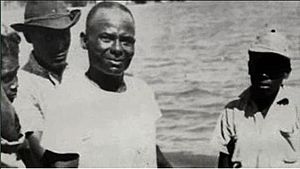Stanley Stair facts for kids
Quick facts for kids
Stanley Stair
|
|
|---|---|
 |
|
| Born | 20 October 1900 |
| Died | April 2008 (aged 107) Animal Hill, Lucea, Jamaica |
| Allegiance | |
| Service/ |
British West Indies Regiment |
| Years of service | 1916–1918 |
| Rank | Private |
| Unit | 3rd Battalion |
| Battles/wars | World War I |
| Awards | |
Charles Stanley Stair (born October 20, 1900 – died April 2008) was a brave soldier from the British West Indies Regiment. He was the very last soldier from the Caribbean who fought in World War I to pass away. He joined the army in 1916 when he was just 15 years old. Stanley Stair traveled from Jamaica to France and Italy. He was one of more than 15,000 men who volunteered for "The Coloured Regiment." After the war, he received two special awards: the British War Medal and the Victory Medal. He lived a very long life, reaching 107 years old!
Contents
Early Life in Jamaica
Stanley Stair was born in a place called Bellview, in Saint Ann Parish, Jamaica. His parents were Adolphus and Sarah Stair. In 1907, his family moved to Haughton Court Estate. This was a large farm where both his parents worked.
Joining the Army
When Stanley Stair was only 15, he wanted to join the British West Indian Regiment. He was too young to sign up, so the army office turned him away. But Stanley was very determined to help in the war. His grandchildren said he went to a different army office in the same town. There, he told a small fib about his age so he could join.
A Difficult Journey
In March 1916, Stanley was one of 1,140 volunteers who left Jamaica. They sailed on a ship called the Verdala. Their ship had to change its path to Halifax, Nova Scotia, to avoid a German warship. In Halifax, a terrible snowstorm hit. Many soldiers were only wearing their summer uniforms. About 600 men suffered from the cold. Five soldiers died, and over 100 had to have parts of their bodies removed because of frostbite. Luckily, Stanley Stair was not hurt. He finally arrived in France with the 3rd Battalion in September 1916.
Life on the Front Lines
Stanley's unit was part of the manual labor corps. This meant they did hard and dangerous work. They dug long trenches for soldiers to hide in. They also carried heavy artillery shells to the big guns. British journalist Ian Hislop said the work these Black soldiers did was "dangerous drudgery." This means it was very risky and boring work.
Stanley himself told a newspaper that after a year and a half in France, his unit moved to Italy. The train journey took 11 days. While passing through Brindisi, their train crashed into an Italian passenger train. Many people on the other train were hurt. Stanley Stair was the only one of his close friends who joined the army with him from Jamaica to survive the war.
Life After the War
After the war ended, Stanley Stair went back home to Jamaica. He worked on sugar plantations for many years, even into the 1960s. For four years, he also worked in Cuba for nine months each year. Then, he returned to the Haughton Court Estate in Jamaica. He worked hard and eventually became the plantation overseer, which meant he managed the farm. Stanley Stair was married twice and had nine children of his own. He also helped raise a total of fifteen children.
In 2004, Stanley Stair received an award from the Hanover Homecoming Foundation. This award honored his important contributions to the Hanover Parish. He passed away in April 2008 at the age of 107. He died in Animal Hill, a community in Lucea, Jamaica, that he had helped to name. When he died, he was the last surviving Caribbean World War I veteran who had fought on the western front.
Remembering Stanley Stair
In 2007, the Hanover Chamber of Commerce started a plan to build a cenotaph. A cenotaph is a monument that honors people who died in a war but whose bodies are buried elsewhere. This monument would honor local heroes of World War I and World War II, including Stanley Stair. The year after he died, two of Stanley's grandchildren in London were interviewed. They spoke to Ian Hislop for a TV show called Not Forgotten. The episode was titled "Soldiers of Empire."
See also
- British West Indies Regiment
- George Blackman
- List of last surviving World War I veterans by country
 | Frances Mary Albrier |
 | Whitney Young |
 | Muhammad Ali |

